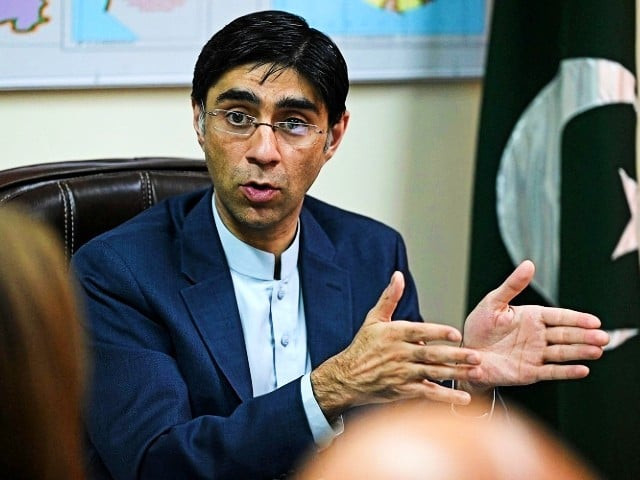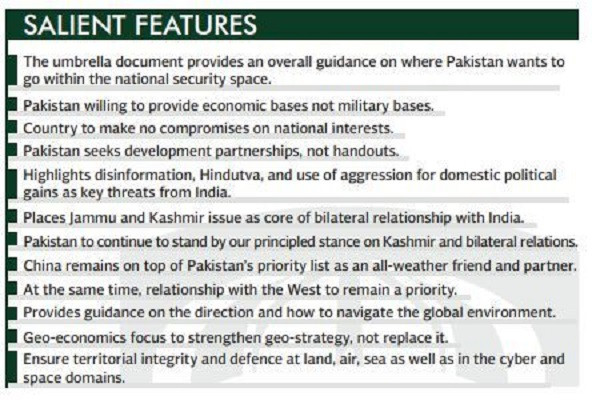Maiden policy: Citizens’ security takes centre stage
On eve of launch of national security policy, NSA Yusuf sees its implementation as a challenge

As Pakistan unveils its maiden National Security Policy, its implementation, the premier’s adviser on the matter cautioned, is a challenge.
The broad-ranging policy document, drafted after going through innumerable hoops and hurdles over the past seven years, according to Dr Moeed Yusuf, aims to set Pakistan's national security direction. According to the National Security Adviser (NSA), the policy has a chapter on all important issues – with a particular focus on human security – through economic security.
The National Security Policy (NSP), which Dr Yusuf clarified, is not a strategy document, provides specific advice on defence, economy, population, health, etc. “This document is an umbrella which gives you the overall guidance on where Pakistan wants to go within the national security space, said Dr Moeed Yusuf.
While defining the overarching vision, the 100-page policy manual, the NSA explained links sectoral policies such as the internal security policy, defence modernization, foreign policy, food security, and water security. However, the challenge, he said, remains the implementation of the policy. “We have identified priority policy actions, identified against departments, provinces, or institutions who will lead each activity. The implementation plan will be the make or break here,” cautioned Dr Yusuf. “We are committed to implementing this in earnest, but I am also clear that it will be as challenging as crafting such a policy document. So, as they say, our job is only half done,” he added. The NSA said the new policy document, which came together after more than 600 rounds of consultations across the country, with experts, academics, and the National Security Divisions own council of experts, places the citizens and economic security at the core.
“We are espousing confidence by putting this out. It should convey our bold conviction that this is where Pakistan is going. Where is Pakistan going? Human security for its citizens – coming through economic security and stronger military security as a dividend of stronger economic security,” the NSA explained during a no-holds-barred interview with The Express Tribune.
Economic security
Commenting on the recommendations for economic security in the NSP, Dr Yusuf emphasized the security of the most vulnerable citizens. He defined national security as the security of the most vulnerable citizens. “And you get there by keeping economic security at the core – which in simple terms means you have a larger pot of national resources – money to spend on human security and military security,” explained the NSA. Geo-economics, he added, cannot be divorced from geopolitics and geo-strategy. “It is not that when you say economic security is at the core, the other parts of security have to take a backseat. That's not the idea at all. The idea is if you keep economic security at the core, you have more resources to spend overall on military and human security. And for both human security and military security, I can tell you, I foresee much greater requirements in the future, given the neighborhood, given where India is going, and given how great power competition is shaping up,” said Dr Yusuf who crossed the finish line by producing the policy document that was initiated by Sartaj Aziz, his predecessor, in 2014.
Human security
When asked about the aspects of human security covered in the NSP, Dr Yusuf said the document looks at how a wide variety of issues impinge on national security. “Number one is population because every single element of scarcity is linked to population because that defines the number of mouths you feed, the number of people you have to cater to. With that, you’ve got the issue of rapid urbanization because what's happening is that your rural areas don't have the kind of services they need. Urban cities are under pressure.” Discord, Dr Yusuf explained, begins to come on through that. “If there is alienation, haves versus have-nots become a national security issue. So, the population is one, climate resilience and water, again linked to resources. Health security, gender security, and food security. But we are not talking about how to reform the health sector. We're not talking about the technicalities of how to reform the water management issue. In this document, we are looking at how these impinge on national security and only focusing on that part.”
Unity and Diversity
On promoting unity and diversity, the NSA said: “It's one of the single most important national security issues as far as I'm concerned.” Pakistan, he said, is a proud Islamic Republic and the Constitution defines its identity. “It also is one of the most diverse countries ethnically, religiously, culturally, and linguistically. Our paradigm of national cohesion has to be to celebrate this diversity and build on this diversity, rather than using it to create fault lines. And, unfortunately, one of our biggest challenges is that this diversity has been used by internal and external elements to create divisions. We need to reverse that. And for that, education is one tool, public discourse, national dialogue is another tool, the political leadership space, Parliament, that's another tool. Bringing back civics into our public conversation is yet another tool. That's what you have to build around.”
Foreign front
On the foreign front, the new NSP highlights disinformation, Hindutva, and the use of aggression for domestic political gains as key threats from India.
Read We’re not part of camp politics: NSA
According to Dr Yusuf, it places the Jammu and Kashmir issue as the core of the bilateral relationship. When asked about the message it sends to Pakistan’s rival, Dr Yusuf said: “it tells India to do the right thing and jump on the bandwagon to benefit from regional connectivity to uplift our peoples. It also tells India, if you don't want to do the right thing, it will be a loss to the entire region, but most of all India.”
For the two nuclear neighbors to move forward on the agenda of connectivity, economic prosperity, Dr Yusuf said, India will have to do right by the Kashmiris. “And given where India is going, it will help them get off their suicidal path. So, the first message in our focus on India, neighborhood, and beyond, is peace and connectivity. But if the other side is bent upon destroying itself, we will continue to stand by our principled stance on Kashmir and bilateral relations, no matter what. That's the message they should take,” the NSA said.
For the rest of the world, according to the NSA, the policy document conveys a very simple message. Pakistan, he said is committed to making no compromises on its national interests, and neither is the country interested in providing military bases. The policy, he said, presents a clear picture of where Pakistan is heading in terms of its transactions and dealings with the world. Islamabad, he said in no uncertain terms, seeks development partnerships, not handouts.
“Pakistan will be unapologetic, will be pragmatic, and we'll be proactive in our approach to external issues. We put this very clearly in this policy. We have nothing to hide. All countries have interests, and they pursue them. We will pursue ours unapologetically. But the world needs to know that economic diplomacy is our number one focus. The world needs to know we are interested in providing economic bases, not military bases as we see ourselves as a melting pot for global and regional economic interests,” the NSA told the Express Tribune.
According to Dr Yusuf, the new policy document guides the direction and how to navigate the global environment. “It doesn't provide any nuts and bolts because again, that's for the particular institution in charge of that subject to do. But the one line I'll give you here is we are not interested in camp politics — not because we are with one or the other. It doesn't suit us.”
The idea of geo-economics, he explained, is built around a melting pot for global economic interests. “We want China to do more business with us. We want the Americans to do more business with us. We want good relations with everybody. And let me also make this very clear to you. China is absolutely an all-weather friend and partner of Pakistan. No question about it. At the same time, an excellent relationship with the West has always been and will remain a priority too,” he stressed.
When asked about emerging threats – particularly technologies such as artificial intelligence, Dr Yusuf said, the document provides guidelines and specific actions to deal with such threats. The NSP, he said covers territorial integrity and defence at land, air, sea as well as in the cyber and space domains. Toward the end of the interview, the NSA said he was committed to making a version of the document available for the citizens of Pakistan. “It won't be the whole document. It won't have details. But it will give a very clear sense of the overall gist and direction of the document. I commit to that,” the NSA said toward the end of the interview.




















COMMENTS
Comments are moderated and generally will be posted if they are on-topic and not abusive.
For more information, please see our Comments FAQ